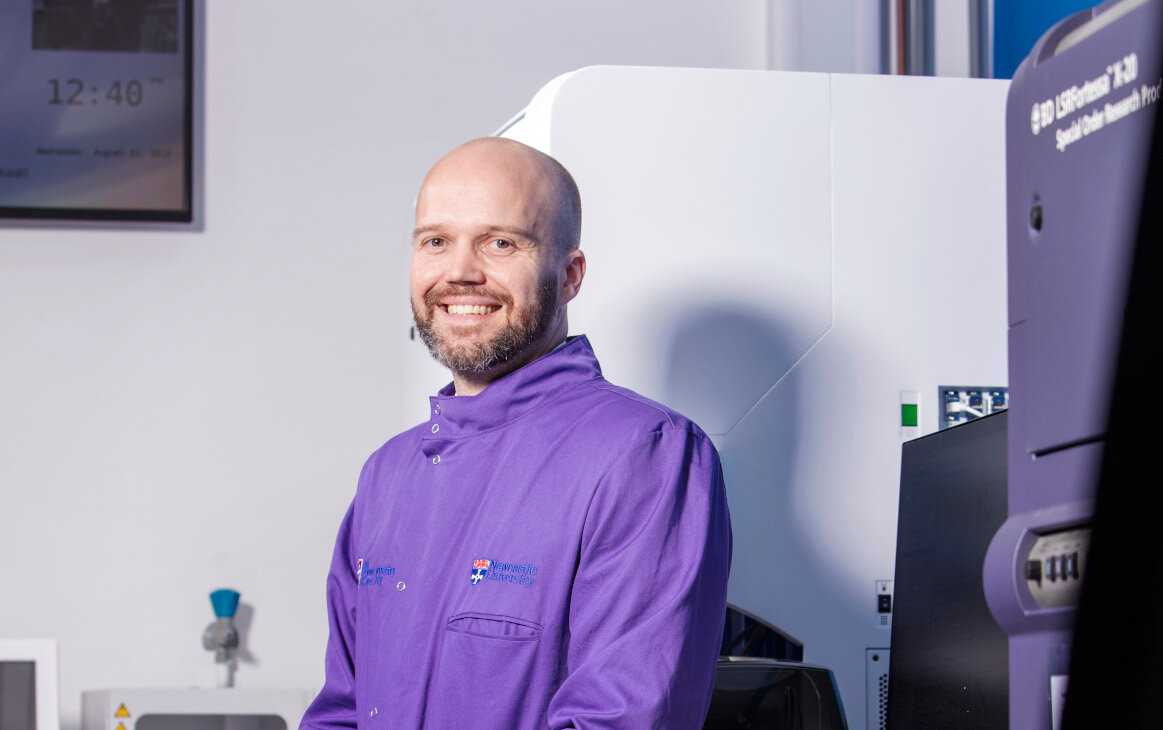
Professor Andrew Filby is Professor of Enabling Biomedical technologies and deputy Dean of the Biosciences Institute at Newcastle University.
He holds several roles within the university – he is the academic director of the Flow Cytometry and Single cell technologies Platform., he leads the Innovation, Methodology and Application (IMA) Research Theme within the Faculty of Medical Sciences, is a co-director of the Biomedical Engineering Newcastle Centre of Research excellence (NUCoRE) and is a Deputy Dean of the university’s Bioscience Institute. Most importantly, says Andrew, he is a proud to be a Research Technical Professional (technician).
What does a positive research culture look like to you?
It is about recognising that effective research and teaching requires a multi-disciplinary team that should embody and include diversity in all senses of the word. While it must be goal focused and results driven, it should also be respectful and nurturing with recognition and reward for all who play their parts effectively.
At Newcastle we recognise how a positive research culture underpins our aspirations to deliver excellence, innovation and creativity in research and research-led education. Our people are our most valuable asset, and their diverse experiences, expertise and ideas are central to achieving our missions and goals.
If you could change one thing about current research culture, what would it be?
Traditional views of research are still dominated by the idea that the large grant awarded to a single principle Investigator (PI) is the only way to be successful and also to measure success. It is my hope that the funding agencies move further away from this model and outdated view, as if they do, universities will have to follow suit.
This will mean, hopefully, we see better recognition and reward for everyone involved in delivering excellent research and teaching and not just the sole PI who “won the money”. Newcastle’s Vice-Chancellor hosts regular ‘Celebrating Success’ events, to bring together and celebrate colleagues’ achievements, and this is a great example of creating an opportunity for a whole team involved in securing a major grant to be recognised for their contribution. It really helps to foster a culture of community and mutual respect.
How will the N8’s statement in support to the TALENT commission support technicians?
It is very encouraging to read the N8 statement of support for the findings and recommendations of the TALENT commission. It is my hope that this leads to member institutions adopting these recommendations and helping to create a culture and workplace where technical staff are recognised and rewarded for excellence. This should hopefully lead to defined career pathways for technicians and to attract a new generation to these roles.
Can you highlight a specific project you have worked on that has benefited from a healthy research culture?
During the COVID pandemic my team and I were part of the UK Covid Immunology Consortium, working to use advanced tissue imaging technologies to further our understanding of how the virus was causing fatal lung pathology.
This was a wonderful example of team science as it involved both research technical professionals, clinicians and academic researchers. It also involved a consortium of other institutes and universities. Each person in the team brought specific, essential skills and knowledge to the project and really highlighted the role of technical staff in delivering high-pressure, cutting-edge research.
Is there anything else you can tell us about how universities can better support technicians?
I think the sector needs to move away from the view that single PIs and their “own labs” are the answer for delivering effective research; a more modular approach is better and encourages more engagement with specialist technical roles. This will also encourage better practices with data generation toward solving issues with reproducibility and repeatability. It would also improve the retention and career development opportunities for technicians.
There has never been a more exciting time to be a technician in the UK. I would like to see more Institutions engaging with the newly formed UK Institute for Technical Skill and Strategy (UK-ITSS). This is a wonderful example of how the landscape has changed for technicians over the last few years and will build on the TALENT report recommendations and the work of the Technician Commitment.
At Newcastle University we have established NU TechNet – a network run by and for our technicians – which is a major part of identifying and driving some of the initiatives within the Technician Commitment. Through NU TechNet we are leading the way in recognising and celebrating the professionalism of our technicians, and also providing vital peer group support.